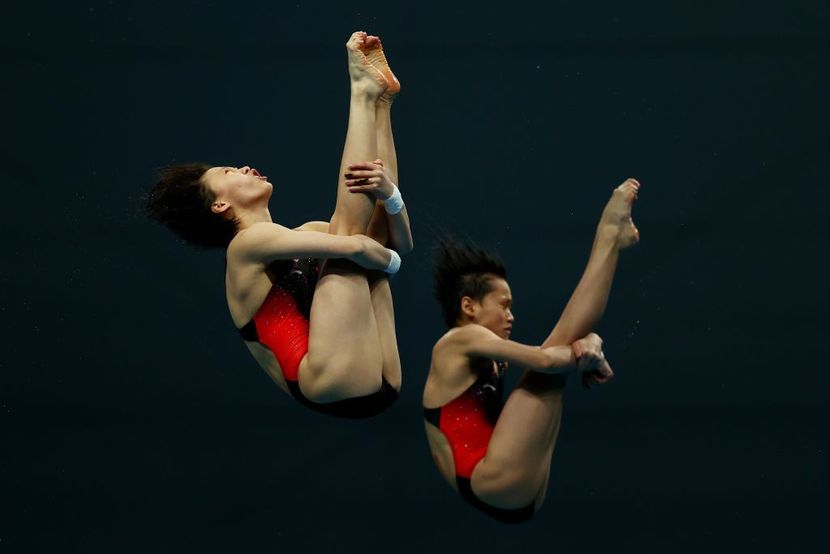
China ended Thursday with an 11-peat in women’s 10m synchro and an 8-peat in men’s 1m. But 25% of the eight-peat came from Li Shixin, who took the bronze – at age 34 – for Australia.
BUDAPEST (Hungary) – It’s been a better-than-excellent week for China’s diving program.
Not only has the nation won every diving event so far in Budapest (9 of 9), its athletes are starting to double and triple up on gold.
On Thursday, Wang Zongyuan won his third world title of 2022 while his countrywomen Chen Yuxi and Quan Hongchan earned their second golds in Budapest.
Yet that’s nothing compared to the legacy they’ve extended.
Chen and Quan’s victory gave China an 11-peat in women’s synchro platform. (Chen and Quan weren’t even born when the streak began, in 2001.)
And Wang made it eight-straight for China in the men’s 1-meter.
But the craziest twist of the day is that 25% of that men’s eight-peat came from Li Shixin, who took the bronze medal on Thursday – at age 34 – for Australia.
Li was a two-time world champion on the 1-meter for China, in 2011 and 2013.
Since then, Li said, “It’s been tough nine years. It’s a long story. I retired in 2014. Actually, I was injured and my age [26] was a little old by the Chinese team, so not a lot of opportunities. In 2017, I went to Australia to become a diving coach. Because I was young [29 at the time], sometimes I could show the athletes I can still do [the dives]. Another coach said maybe you can try to compete. Why not? Maybe have an opportunity to go to the Olympics.”
In 2019, he became an Australian citizen, and finally, last summer in Tokyo, he made his Olympic debut, placing 27th on the men’s 3-meter springboard.
After returning to the world championship podium, any chance we might see him at 2024 Paris Olympics?
Li was non-committal. “Some young athletes in Australia are saying, ‘Maybe you can try for 2032 Brisbane. I said, ‘No, maybe my kid.’ I have three girls. Tomorrow is my big daughter’s birthday, July first. I think that [bronze medal] is a very good gift for her. I also have twins born on the 4th of July. I think it’s a very good gift for them.”
Find out who else made Thursday’s podiums, below.
Women’s 10m synchro
As mentioned, China clinched its 11th straight victory in the women’s 10-meter synchro final thanks to the powerhouse pair of Quan Hongchan and Chen Yuxi, the teenagers who finished 1-2 in the individual 10m event at the Tokyo Olympics, only to flip their podium placements Budapest.
Quan and Chen won all five rounds of diving and their final score (368.40) was a full 69 points – nearly a whole dive’s worth – ahead of the out-of-the-blue silver medalists Delaney Schnell and Katrina Young of the U.S..
Schnell had taken Olympic silver in this event last summer with a different partner, but the new American duo was in second-to-last place after its first two dives. Their next dive put them in fifth place, the next put them in fourth, and, on their final dive, they captured silver by overtaking Malaysia’s Pandelela Pamg and Nur Dhabitah Sabri by 72-hundredths of a point, and Japan’s Matsuri Arai and Minami Itahashi by 1.56 points. (Prior to that, Malaysia and Japan had been locked in the 2-3 positions all days.)
Bronze went to Malaysia and that meant that Pamg, 29, earned her fourth world championship medal in this event to go with 2009 bronze, 2017 bronze, and 2019 silver.
“It means a lot to me to have this podium,” said Pamg. “The last few days have been very long and tiring, so I’m really happy that we’ve made the dives well.”
Men’s 1m final
Wang obliterated the men’s 1-meter field to win his third world title of 2022. His final score for six dives was just 6.7 shy of the 500-point barrier.
Yet Wang didn’t lead every round. His teammate Zhang Jiuyuan overtook him in round two, before falling apart in the last half of the contest and placing eighth.
Jack Laugher of Great Britain took silver with 426.95 points. He had been in the hunt all day.
“Today that battle was great, “Laugher said, but “I was never gonna catch him,” referring to Wang. “The guy is 21 and he’s insane…but I am pleased with myself and what I have done. Three medals is great.” Laugher also captured bronze in 3-meter and silver in 3-meter synchro.
Li Shixin, 34, of Australia came into the medal mix after his fifth dive when he bypassed France’s Jules Bouyer (who stayed in fourth place through all six dives), and Zhang whose form was rapidly slipping.
After Li captured bronze with 395.40 points, he said, “It’s been tough nine years,” since he won his second world championship title (for China) in 1-meer. “The Covid period was hard, but now here I am with a medal. I want to thank my family, my team and the coaches. I am very happy.”